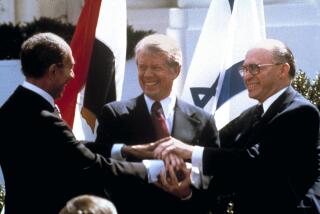Obama’s decision to cancel U.S.-Egypt military exercise presents risks
- Share via
WASHINGTON — President Obama’s decision to cancel a planned joint military exercise with Egypt, while less drastic than other options he might have chosen to show his displeasure with the bloody crackdown in Cairo, risks new strains in the United States’ already problematic relationship with the new military government.
Breaking his silence on the lethal attacks by security forces on civilians in the Islamist opposition, Obama announced Thursday morning that he was canceling the biannual Bright Star exercise, which involves thousands of U.S. and Egyptian troops. He said he was reviewing other punitive steps, including a halt to the $1.5 billion in U.S. aid earmarked for Egypt.
The joint exercise is not essential to U.S.-Egyptian security cooperation. But the risk for U.S. policymakers is that the Egyptian military will read it as an affront and react by cutting back help that the Obama administration very much wants, including controlling rising violence in Sinai that threatens Israel and trying to prevent attacks on Christian churches in Egypt, analysts said.
The Egyptian military could try to use the U.S. move to bolster its now-battered domestic political standing, portraying itself as resisting American bullying.
“I can see them trying to build this up as an affront and trying to ride anti-American sentiment,” said Stephen McInerney, executive director of the Project on Middle East Democracy, a nonpartisan group in Washington.
If Egypt’s military cut back on cooperation, it “would be extremely troubling and potentially a serious threat to our position in the region,” he said.
The U.S. relationship with the generals was fairly strong going into the crisis, which began in July with the military-led ouster of President Mohamed Morsi, the country’s first democratically elected leader. But it has been fraying since then, as the military has repeatedly ignored U.S. advice to ease up pressure on the Islamist opposition, including arbitrary arrests and detentions, and move toward restoration of democracy.
The crisis has been another blow to American prestige in the Arab world. In its attempts to avoid alienating either the military or its opposition, the Obama administration has appeared both ineffective and unprincipled to audiences in the region, said McInerney.
Even so, it is unlikely that the new government in Egypt will directly challenge some key U.S. goals in the region. The military is unlikely to try to end the Egypt-Israeli peace treaty, for example, because it would not want to risk conflict with its well-armed neighbor during a period of intense internal instability.
“This has been a significant blow to American credibility and prestige, but I don’t think it’s the end of the world for our key security interests,” said Aaron David Miller, a former U.S. diplomat who is a vice president at the Wilson International Center for Scholars in Washington.
ALSO:
Death toll in Egypt crackdown hits 525
U.S. seeks extradition of Mexican behind DEA agent’s death
Soccer World Cup 2018 host Russia is asked to explain anti-gay law
More to Read
Sign up for Essential California
The most important California stories and recommendations in your inbox every morning.
You may occasionally receive promotional content from the Los Angeles Times.














